|
|
|
Sort Order |
|
|
|
Items / Page
|
|
|
|
|
|
|
| Srl | Item |
| 1 |
ID:
189935
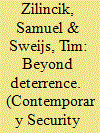

|
|
|
|
|
| Summary/Abstract |
Contrary to detailed work on deterrence by punishment, Western strategic thought about denial and its effects is conceptually muddled at the expense of effective strategy-making. This article seeks to reconceptualize denial and rethink its emotional effects. It defines denial as a strategy aimed at frustrating the adversary’s military power and proposes four different denial logics: capability elimination, operational paralysis, tactical degradation, and strategic effect reduction. It then turns to the effects through which these denial logics generate favorable consequences, and singles out the emotions of despondency, resignation, fear, and disappointment as the key factors that mediate their impact. The article offers a framework that can help guide further theoretical reflection and empirical research, as well as inform the development of policies and strategies in today’s world.
|
|
|
|
|
|
|
|
|
|
|
|
|
|
|
|
| 2 |
ID:
153271
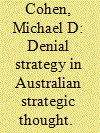

|
|
|
|
|
| Summary/Abstract |
Although denial has been at the centre of Australian strategic thought for decades, it has frequently been used as a broad catch-all term. This article shows, however, that there are two distinct denial traditions in Australian strategic thought: anti-access denial and area denial. Despite the different denial strategies having significantly different implications for defence budgets, procurement and force structure, official strategic guidance and defence scholars themselves have rarely specified which variant they are referring to. This article first maps the conceptual genealogy of anti-access denial and area denial within Australian strategic thought, before showing why acknowledging the specific type of denial is critical for policy and operational considerations. In addition to the two traditional approaches to denial, this article introduces a third approach—‘dissuasion by denial’—which, notwithstanding its growing influence in deterrence research and high relevance to twenty-first-century Asia-Pacific security dynamics, has yet to be introduced into Australian denial debates. The article finally addresses the conditions under which each denial strategy would be the most appropriate for Australia.
|
|
|
|
|
|
|
|
|
|
|
|
|
|
|
|
| 3 |
ID:
184133
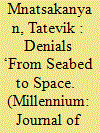

|
|
|
|
|
| Summary/Abstract |
Despite critiques of denials broadly underlying Critical International Relations deconstructions of state, security and subjectivity, there is little explicit exploration of the ontological status of denial, and how denials operate in the politics of (in)security. Animated by the question, why and how web of actors and interests traversing the public and private spheres involved in the provision of security endure despite long-running critique, this article problematises = denials. An explicit theorisation of denial needs to be put centre stage in the study of security. Drawing on Dillon’s theorisation of the unstable duality of (in)security and synthesising it with a Deleuze and Guattarian assemblage approach, it theorises denial in two forms – denial of complicity and denial of the impossibility of security – as ontologically necessary for the politics of (in)security; then proposes that we scrutinise and expose assemblages of (in)security. These assemblages form, endure and expand, by thriving on denials of the impossibility of security and its attendant complicities; forming symbioses of denial traversing the public-private realms. Assemblages of (in)security adapt, expand, and propagate new technologies of (in)security, often ironically by responding to demands from critique. Without an assemblage-based thinking, we are methodologically ill-equipped to trace, expose and critique the politics of (in)security, without unwittingly partaking in denials sustaining it.
|
|
|
|
|
|
|
|
|
|
|
|
|
|
|
|
| 4 |
ID:
145978
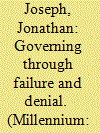

|
|
|
|
|
| Summary/Abstract |
This article sets out a new way of understanding how resilience works as a form of governmentality with specific focus on international interventions. It argues that resilience governs though failure and denial, suggesting that it builds on both failures to govern complex systems and past failures of intervention, in order to promote a new governance through denial that further shifts responsibility onto the governed. It suggests that resilience, rather than being a radical new approach, fits with existing discourse and practices, but offers something new in terms of its approach to knowledge, the social, and the human. Running this through the themes of failure and denial, the article suggests that resilience offers certain possibilities for human action, but that its emancipatory potential is largely constrained by the way it limits how we understand the bigger picture. This is explored in relation to international interventions and the way that resilience contributes to global governmentality.
|
|
|
|
|
|
|
|
|
|
|
|
|
|
|
|
| 5 |
ID:
174032
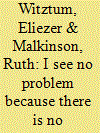

|
|
|
|
|
| Summary/Abstract |
This article discusses denial and silence pertaining to events from the Palestinian Intifada (1987–93) as confronted by medical and mental health professionals. It defines denial from a multidisciplinary perspective comprising psychoanalysis, cognitive psychology, sociology, and medicine, then analyzes personal recollections as well as texts from interviews with psychologists, social workers and psychiatrists. Using the concept of Professional Historical Error, the article shows that some professionals failed to recognise and accept the presence of the Intifada in denying potential mental distress and injuries among soldiers involved in military actions.
|
|
|
|
|
|
|
|
|
|
|
|
|
|
|
|
| 6 |
ID:
161142
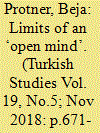

|
|
|
|
|
| Summary/Abstract |
The history of Turkey, as experienced by its minority populations, is characterized by instances of demographic and topographic engineering, war, dispossession, and political violence. Rather than being single historical events, these are longue durée systematic processes of Turkification that have continuity with contemporary political arrangements and privileges, despite the fact that the notion of Turkishness has been continuously changing. This article reflects on ethnographic research and interviews with liberal Turkish university students in Istanbul about the Turkish–Kurdish conflict, conducted during a time of relative peace and political optimism. It discusses Turkish liberals’ silencing of state violence and denial of privilege constituted through violence. This ‘forgetting’ is conceptualized as a continuous investment in Turkishness, which involves complicity. Such analysis of belonging might help to explain today’s lack of political mobilization and solidarity between the Kurdish movement and opposition groups in the present time of growing political oppression.
|
|
|
|
|
|
|
|
|
|
|
|
|
|
|
|
| 7 |
ID:
174717


|
|
|
|
|
| Summary/Abstract |
Approximately 8,000 boys and men were killed in the 1995 Srebrenica genocide. The victims were disappeared, killed and buried in secret mass graves. In this article, I examine how forensic anthropologists, demographers and forensic geneticists produced technolegal knowledge about the number of victims in the wake of the genocide; how those numbers were validated in legal proceedings against those held responsible; and, finally, how some have tried to destabilize the numbers in attempts to deny that a genocide was committed. While numbers, and the larger category of knowledge, take centre stage in the discussion, I use Srebrenica’s aftermath to introduce the concept of ontologically dirty knots, which is an analytical and methodological innovation that enables us to produce scholarly accounts of events, such as the Srebrenica genocide, that are characterized partly by secrecy, partly by controversy and partly by materiality. It ties together meaning and materiality, signals a process that continues to evolve, and suggests that narratives about what happened are the results of entanglements, action and friction that can be undone. In these respects, the article addresses current discussions on actor-network theory within critical security studies.
|
|
|
|
|
|
|
|
|
|
|
|
|
|
|
|
| 8 |
ID:
095474


|
|
|
|
|
| Publication |
2010.
|
| Summary/Abstract |
War reconciliation and cultures of memory themes continue to receive high attention but despite the long list of newly released books praising Germany which has been thought to be more prone to experience guilt and from it ensuing war responsibility for its past than the Japanese nation in the aftermath of World War Two [46], the long shadows of the past are still prevailing in both countries. Even if Germany scores better then Japan from a comparative perspective this does not mean that Germany has internally resolved the problems related to its past once and for all. Yet, the slave labor compensation legislation in Germany which was meant to definitely settle the accounts with the past has shown that lasting war reconciliation is possible. The unwillingness of Japanese Government officials to admit past wrongdoings, to apologize for coerced war prostitution and to refuse to compensate former slave laborers has put Japan on the frontline of international criticism. The claim that Japan as a nation has not learned from history is critically re-assessed against the backdrop of bottom up NGO reconciliation activities and lawmaker efforts to enact legislation aimed at resolving the comfort women issue. In contrast to conventional explanations it is argued that different circumstances, influenced by distinct historical and political factors in each country, resulted in different approaches. In Germany the social protest movements led to the institutional birth of the Green Party. The Greens initiated the reconciliation process for former slave laborers and changed the political landscape from the bottom. In Japan the social protest movements did not succeed to settle as a novel political force. Thoughtlessness, ignorance, conspiracy of silence, "double victimization" stigma, "negative pacifism" and the reluctance to address the war guilt issue prevented a public discussion. It is then sought to answer the question: Why do people repress or deny past wrongdoings despite knowing the facts? It is looked at how consecutive generations in Germany and Japan have coped with guilt and shame feelings in different ways. The article concludes that war reconciliation similar to restorative justice is an ongoing, never-ending process. The emotional part of reconciliation which goes far beyond words of apology, judicial punishment or monetary compensation and does not necessarily lead always to positive outcomes is given particular attention. Ways of civil society bottom-up reconciliation in Germany and Japan are explored.
|
|
|
|
|
|
|
|
|
|
|
|
|
|
|
|
| 9 |
ID:
168185


|
|
|
|
|
| Summary/Abstract |
This paper explores strategies deployed by a sample of white, British-born South Africans to account for their positions during apartheid and post-apartheid. Whereas literature on white racism identifies denial as a key strategy towards racial discrimination and the maintenance of privilege, the historical and political 10 context of South Africa makes this tactic implausible. The paper contributes to understandings of pluralism within white identifications through investigation of diverse discursive strategies used to frame the overtly racist, apartheid regime and the present post-apartheid, supposedly, ‘post-race’ state. A range of positions attempting to minimise individual implication are identified. 15 A common feature however is to reimagine the structure of social relations in order to diminish responsibility for the sins of the past or the success of the future; suggesting profound difficulties in adjusting to the new social reality.
|
|
|
|
|
|
|
|
|
|
|
|
|
|
|
|
| 10 |
ID:
167651


|
|
|
|
|
| Summary/Abstract |
This paper explores strategies deployed by a sample of white, British-born South Africans to account for their positions during apartheid and post-apartheid. Whereas literature on white racism identifies denial as a key strategy towards racial discrimination and the maintenance of privilege, the historical and political 10 context of South Africa makes this tactic implausible. The paper contributes to understandings of pluralism within white identifications through investigation of diverse discursive strategies used to frame the overtly racist, apartheid regime and the present post-apartheid, supposedly, ‘post-race’ state. A range of positions attempting to minimise individual implication are identified. 15 A common feature however is to reimagine the structure of social relations in order to diminish responsibility for the sins of the past or the success of the future; suggesting profound difficulties in adjusting to the new social reality.
|
|
|
|
|
|
|
|
|
|
|
|
|
|
|
|
| 11 |
ID:
180624


|
|
|
|
|
| Summary/Abstract |
This article examines the concept of genocide denial as a security threat within the case study of Rwanda. Rwanda experienced the 1994 Genocide Against the Tutsi when an estimated 800,000 Tutsis and politically moderate Hutus were butchered by extremists within a one-hundred-day period. Since the ending the genocide the Rwanda Patriotic Front (RPF) continues to dominate the post-genocide nation's political sphere. The remnants of genocide perpetrators initiated Rwanda to militarily and politically intervene in neighbouring Democratic Republic of the Congo (DRC). Since the end of the Second Congo War in 2002, Rwanda's security interests shifted from fearing the destruction of the state to ontological insecurities founded on a threat of genocide ideology. This research examines whether Rwandan President Paul Kagame and the RPF mobilises genocide denial through a securitisation framework as a method to legitimise its control over the nation's political institutions and to deflect criticism. However, by examining the deficits within this discourse, it becomes possible to understand how Rwandans perceive genocide denial as part of a large threat that is a repetition of the genocide.
|
|
|
|
|
|
|
|
|
|
|
|
|
|
|
|
| 12 |
ID:
093602


|
|
|
|
|
| Publication |
2010.
|
| Summary/Abstract |
Although prolonged occupation of a nation is no longer a common phenomenon, where it does exist, it bears harsh implications for all parties involved. This article examines the socio-psychological implications of occupation on the occupying society, using the case of the Israeli occupation of the Palestinian territories of the West Bank and Gaza Strip since 1967 as an example. The article first delineates the concept of occupation from a socio-psychological perspective, which supplements the legal-formal aspect. The authors then propose a conceptual framework that analyzes the psychology of the occupying society. Within this framework, they describe the psychological challenges that the occupation may pose to the members of the occupying society. Next, they introduce psychological mechanisms that members of an occupying society may use in order to avoid facing these challenges. Finally, they offer a number of ideas regarding the relationship between these mechanisms and the process of ending the occupation.
|
|
|
|
|
|
|
|
|
|
|
|
|
|
|
|
| 13 |
ID:
169177


|
|
|
| 14 |
ID:
072983


|
|
|
|
|
| Publication |
2006.
|
| Summary/Abstract |
This analysis surveys Al Qaeda's employment of denial and deception (D&D) and shows that it uses D&D on tactical and operational levels in order to achieve strategic results. It defines denial and deception and explains how they relate to Al Qaeda, overviews Al Qaeda's changing network structure and seeks to summarize how Al Qaeda employs D&D throughout its operations. This paper is structured to show that denial and deception are institutionalized factors that manifest themselves through all aspects of bin Laden's organization and that the traditional conception of D&D-that nonstate actors are incapable of employing deception as an element of grand strategy-is incorrect.
|
|
|
|
|
|
|
|
|
|
|
|
|
|
|
|
|
|
|
|
|